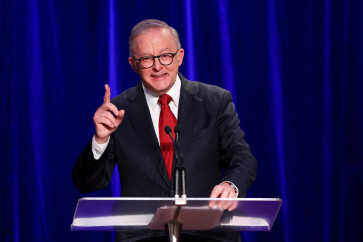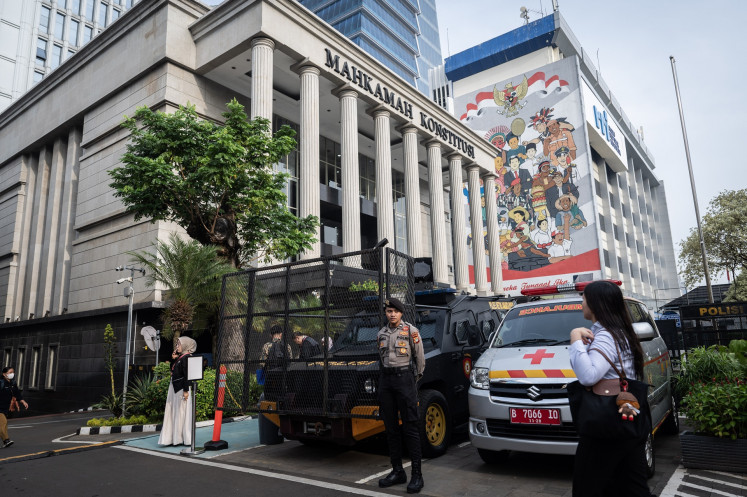2012: Yudhoyono’s final chance to curb corruption
The New Year is approaching
Change text size
Gift Premium Articles
to Anyone

T
he New Year is approaching. As it is less than one week away, this is a great time to review and reflect on the previous year while preparing for the year to come.
It is motivating to reflect on the accomplishments of the previous year, review our challenges and outcomes and prepare for the year to come with a new set of goals. A failure to review the past will likely lead us to fall into the same hole over and over again in the future.
The fight against bribery and corruption has been the watchword this year, which has witnessed a great number of corruption scandals involving high-ranking officials, lawmakers, judges and prosecutors.
Muhammad Nazaruddin’s alleged involvement in the SEA Games sports facility construction scandal, the case
of convicted Central Jakarta Commercial Court judge Syarifudin Umar, the arrest of prosecutor Sistoyo at the Cibinong Prosecutor’s Office, to mention just a few cases, suggest that corruption is really an everyday occurrence for the Indonesian public.
This might backfire for President Susilo Bambang Yudhoyono in 2012. Yudhoyono must use 2012 as his final chance to curb corruption and restore the public trust.
The endless cycle of corruption in 2011 signifies the debacle of reform leadership. The Democratic Party, which initially appeared on the country’s political stage as a reform party, for instance, has slipped off the tracks.
Nazaruddin’s dismissal as the party’s treasurer showed the half-hearted fight against corruption, since there was no political amputation by cutting off its wayward elites.
Party chairman Anas Urbaningrum demurred from resigning, which in turn indicated the party’s lackluster opposition of any political scandal on one side and setting a bad precedent for the country’s politics on the other.
Corruption has become complicated due to trendy political dynasties in the country’s major parties. With Edhi Baskoro Yudhoyono and Puan Maharani becoming the secretary-general of the Democratic Party and deputy chairwoman of the Indonesian Democratic Party of Struggle respectively, the war on corruption is prone to rhetoric and non-transparency owing to internal resistance.
Rather than setting the scene for future young intellectual politicians, mainstream parties prefer elite families to maintain their power.
In addition, the collapse of law enforcement agencies to curb corruption strongly shows that corruption is a multifaceted phenomenon.
President Yudhoyono, therefore, must drive reform. He must give external bodies more teeth, such
as the Prosecutors Commission that is working to revamp the Attorney General’s Office (AGO) and synergize the Supreme Court and the Judicial Commission to more closely monitor the courts and develop a better system for the recruitment of judges.
Much of the President’s time will be spent on debating urgent bills in 2012. The House has arrived at a compromise to assign a rank the 64 bills on the National Legislation Program in 2012.
One of the 2012’s most pressing bills is an amendment to the 2002 Corruption Eradication Commission Law. During 2011, the idea of dismantling of the country’s most trusted antigraft body came to the fore, especially supported by lawmakers.
Yudhoyono’s commitment to exposing corruption in government and the House would be in vain without stopping any means to strike and criminalize the KPK.
Such potential remains because of growing concern that the House will curtail the antigraft commission’s authority. The House’s budget committee even threatened to suspend discussions on the 2012 state budget to protest the questioning of its leaders by the KPK over graft allegations in a project administered by the Manpower and Transmigration Ministry.
Eradicating corruption in Indonesia cannot simply depend upon the government’s law enforcement agencies such as the National Police and the AGO, considering their corrupt behavior and the closed approaches they frequently applied to many graft cases.
In a transitional period characterized by strong need for power survival, it is not wrong to have a “super body”. Some countries with low rankings on corruption indicies still have superbodies like the KPK.
Singapore’s Corrupt Practices Investigation Bureau, for example, has been in existence since 1952. Combating corruption calls for prevention, not merely enforcement or execution.
It will be quite a job to stamp down corruption to the full in 2013. Overall, political parties in 2013 will be occupied with encountering legislative and presidential elections in 2014. Political energy and resources are centering on political consolidation instead of working for reform commitment.
An intense war on corruption would damage necessary political coalitions and alliances prior to 2014 election since no single party aspires to seeking enemies.
For sure, the bribery fight may work in 2013. Yet such a struggle is no longer something given specific attention. Ideas of a clean government will be powerless given short-term and pragmatic power retention.
Things will get worse as government officers and politicians often get amnesia marked by repeated blackouts on their wrongdoings and vows. It is public knowledge that many politicians prefer to patronize the people rather than listen to their concerns. Populism has gone haywire.
The public has a vey low level of tolerance for leaders who disappoint them. The success of Yudhoyono will be measured by the public trust at the end of his tenure. The very foundation of the public’s trust in Yudhoyono depends on his promise of clean leadership.
The writer is a lecturer in the faculty of cultural sciences of Andalas University, Padang.









